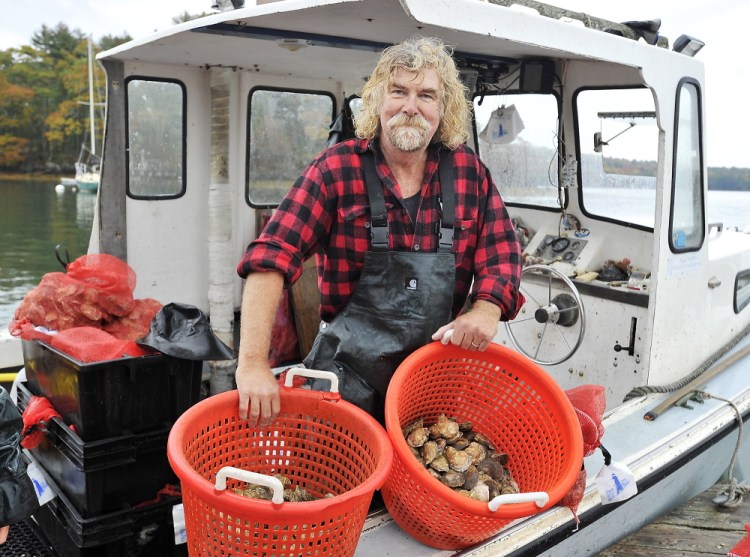Jeff “Smokey” McKeen is one of the stars of celebrity chef Mario Batali’s new cookbook “America Farm to Table,” but he didn’t call Source to boast about it. One of his friends tipped us off to the lush color spread on McKeen and the oyster farming enterprise he co-owns, Pemaquid Oyster Co. McKeen is a graduate of Colby College, where he studied philosophy, and a co-founder of the musical group Old Grey Goose, which he started in 1977, predating his 1986 venture into oyster farming. He picked up the “Smokey” at a bluegrass festival where things didn’t go well; it was more of an alias than a nickname, but it stuck. Source talked Crocs, parasites and bivalves with McKeen.
SO YOU AND MARIO BATALI, TIGHT BUDS? Not quite. Batali knows Melissa Kelly, the chef/owner of Primo in Rockland, and asked her for a recommendation, and she sent Batali to McKeen. Sort of. “Mario actually never came to Maine,” McKeen said. Instead Batali sent one of his people, co-author Jim Webster, out to the Damariscotta River to see McKeen. “That was a year ago in September,” McKeen said. He still hasn’t met Batali.
CARE PACKAGE: But he did send Batali a care package of a couple dozen oysters, Pemaquids from McKeen’s company, to help Batali with his tenth cookbook. “He cooked and experimented with them,” McKeen said. The book features a number of lush photos of oyster dishes, including some on the half shelf and some cooked with squid ink risotto. “Presumably those were my oysters,” McKeen said. Batali’s website, mariobatali.com, also features video of McKeen at work. McKeen plans to give Batali’s variation on oyster stew, cooked in a skillet, a go at some point soon, even though he doesn’t generally bother with cookbooks. “I bake oysters all the time,” he said. “But I don’t really follow a recipe.”
DEEPER MEANING: Batali is so famous he has his own line of shoes. OK, Crocs. And they’re orange. Nonetheless, what does it mean, to be a part of a Batali production? “I don’t know,” McKeen said. “It’s kind of fun. I know he’s well known. Every time I mention his name, people say ‘Oh, the guy with the orange Crocs.'” This isn’t the first time Kelly has sicced one of her culinary celebrity friends on McKeen. When Anthony Bourdain came to Maine intent on bear hunting and oyster slurping, McKeen was asked to sit down and talk with him. “I don’t have a TV in my house and haven’t for years so he wasn’t on my radar. So I went to the interview unprepared.” He didn’t realize, he said, that Bourdain is “a little eccentric,” and McKeen felt he failed to be enough of a “character” for Bourdain. “I ended up on the cutting room floor.”
GOOD FOR BUSINESS? Does Pemaquid Oyster Co. get a boost from Batali’s high profile? “Our business is fairly sustainable at this point. We’ve been farming oysters for almost 30 years and our product is well established. We can sell as much as we can produce. I don’t really need the publicity in that way.” Although the visit with Webster was kind of fun, he said. “I do enjoy showing people around and talking about the river.”
SPEAKING OF: What are your sustainability challenges, outside of the business end of things? “There is always something,” McKeen said. “It is farming, no matter how you look at it, and farming is always dependent on so many variables. For us, it is water quality. There is predators and there is diseases that can raise their heads.” Recently, the oyster farming community in Damariscotta waged its first fight with the MSX parasite (Multinucleate Sphere X), which weakens the oysters and causes a die-off at the end of the summer. A combination of quarantining the Damariscotta River operations and crossing genetic lines over the course of four years seems to have fixed the problem, McKeen said.
WHAT MARIO TAUGHT US: In the book, Batali (or Webster) writes about a trick McKeen uses, moving the oysters around the estuary to deepen their flavor and clean them, depending on the salinity and seasonal temperatures. McKeen confims: An oyster’s flavor is dependent on the water it is living in, even temporarily. Moving them to capture a certain level of saltiness or chilliness is a French technique. “The colder water plumps them up a little,” he said. “That’s the reason that the best time to eat oysters is in the fall.” Say no more; we’re on it Smokey.
Send questions/comments to the editors.




Success. Please wait for the page to reload. If the page does not reload within 5 seconds, please refresh the page.
Enter your email and password to access comments.
Hi, to comment on stories you must . This profile is in addition to your subscription and website login.
Already have a commenting profile? .
Invalid username/password.
Please check your email to confirm and complete your registration.
Only subscribers are eligible to post comments. Please subscribe or login first for digital access. Here’s why.
Use the form below to reset your password. When you've submitted your account email, we will send an email with a reset code.